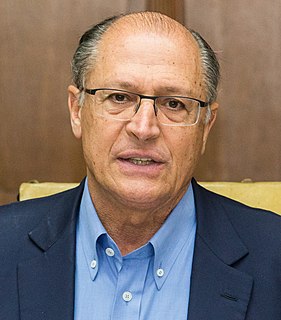
The Democratic Labour Party is a social democratic political party in Brazil.

José Serra is a Brazilian politician who has served as a Congressman, Senator, Minister of Planning, Minister of Health, Mayor of São Paulo, Governor of São Paulo state, and Minister of Foreign Affairs of Brazil.

The Popular Socialist Party is a social democratic political party in Brazil.

The Brazilian Socialist Party is a political party in Brazil. It was founded in 1947, before being abolished by the military regime in 1965 and re-organised in 1985 with the re-democratisation of Brazil. It elected six Governors in 2010, becoming the second largest party in number of state governments, behind only PSDB. In addition to that, it won 34 seats in the Chamber of Deputies and three seats in the Senate, besides having been a member of the For Brazil to Keep on Changing coalition, which elected Dilma Rousseff as President of Brazil.

Geraldo José Rodrigues de Alckmin Filho is a Brazilian politician who served as the Governor of São Paulo from 2001 to 2006, and then again from 2011 to 2018. He was the Brazilian Social Democracy Party (PSDB) presidential nominee for the 2018 presidential election. He is usually described by political analysts and supporters as a pro-business centrist, closely associated with the political and financial establishment.

Ciro Ferreira Gomes, often known monomyously as Ciro, is a Brazilian politician, lawyer, and academic, affiliated with the Democratic Labor Party (PDT). He was the PDT's presidential candidate in the 2018 Brazilian election.
The Democrats is a political party in Brazil. It was founded in 1985 under the name of Liberal Front Party from a dissidence of the defunct PDS, successor to the ARENA, the official party during the military dictatorship of 1964–1985. It changed to its current name in 2007. The original name reflected the party's support of free market policies, rather than the identification with international liberal parties. Instead, the party affiliated itself to the international federations of Christian democratic (CDI) and conservative parties (IDU). The Democrats' identification number is 25 and its colors are green, blue, and white.

Aloízio Mercadante Oliva is an economist and Brazilian politician who served as the Chief of Staff of Brazil between 2014 and 2015. He was a founder of the Workers' Party in February 1980 and vice-chairman of the party between 1991 and 1999, then state senator from São Paulo between 2003 and 2010. From 2011 to 2012 he was Minister of Science, Technology and Innovation in Brazil, and in 2012 he became Minister of Education, due to Fernando Haddad's departure to run for mayor of São Paulo.

The Brazilian presidential election was held in 2010 with two rounds of balloting. The first round was held on October 3 along with other elections as part of the 2010 general election. As no presidential candidate polled 50 percent of the vote on October 3, a runoff was held on October 31 between Dilma Rousseff and José Serra: Rousseff won with 56% of the second round vote.

General elections were held in Brazil on 1 October 2006 to elect all seats in the Chamber of Deputies, one-third of the Federal Senate, and members of the Legislative Assemblies of the 26 states and the Federal District. As no candidate for president received over 50% of the vote, a second round run-off was held on 29 October between incumbent Luiz Inácio Lula da Silva and his challenger, Geraldo Alckmin. A second round was also required in 10 states where no candidate for governor received a majority. Lula won the second round with over 60% of the valid votes and secured a new four-year term.

General elections were held in Brazil on 5 October 2014 to elect the President, the National Congress, state governors and state legislatures. As no candidate in the presidential and several gubernatorial elections received more than 50% of the vote, a second-round runoff was held on 26 October.

The Social Democratic Party is a political party in Brazil led by Gilberto Kassab and uniting dissidents from various political parties, especially the DEM, PSDB and PP. The PSD supported the impeachment of Dilma Rousseff.

Flávio Dino de Castro e Costa is a Brazilian attorney, politician and teacher. A former federal judge, Dino was elected to the Chamber of Deputies in 2006, serving a four-year term until 2011, representing the state of Maranhão. He ran for governor of Maranhão in the 2014 election, and was elected. He became the governor of Maranhão on January 1, 2015.

General elections were held in Brazil on 7 October 2018 to elect the President, Vice President and the National Congress. Elections for state governors and vice governors, state legislative assemblies and the Legislative Chamber of the Federal District were held at the same time.

João Agripino da Costa Doria Júnior is a Brazilian politician, businessman and journalist who is the 37th and current Governor of São Paulo, in office since January 2019. He previously served as the 52nd Mayor of São Paulo from 1 January 2017 to his resignation on 6 April 2018. He was the first mayor in 24 years to be elected in the first round. Doria is a member of the Brazilian Social Democracy Party (PSDB), and is known for having hosted the TV show O Aprendiz, a Brazilian version of The Apprentice. Doria resigned the office of mayor in April 2018 in order to run for Governor of São Paulo.

The 2017 Brazilian general strike took place on April 28, 100 years after Brazil's first general strike in June 1917. The movement was a protest against reforms of labor laws, which were later adopted and social security proposed by Michel Temer government and pending in National Congress of Brazil.

The 2018 presidential campaign of Fernando Haddad for the Presidency of Brazil was announced on 11 September 2018, two weeks after the candidacy of Luiz Inácio Lula da Silva, the former President of Brazil, was denied by the Superior Electoral Court for violating the Ficha Limpa. Haddad, who had been Lula's running mate, replaced him as the candidate and PCdoB state legislator Manuela d'Ávila became Haddad's running mate.

























